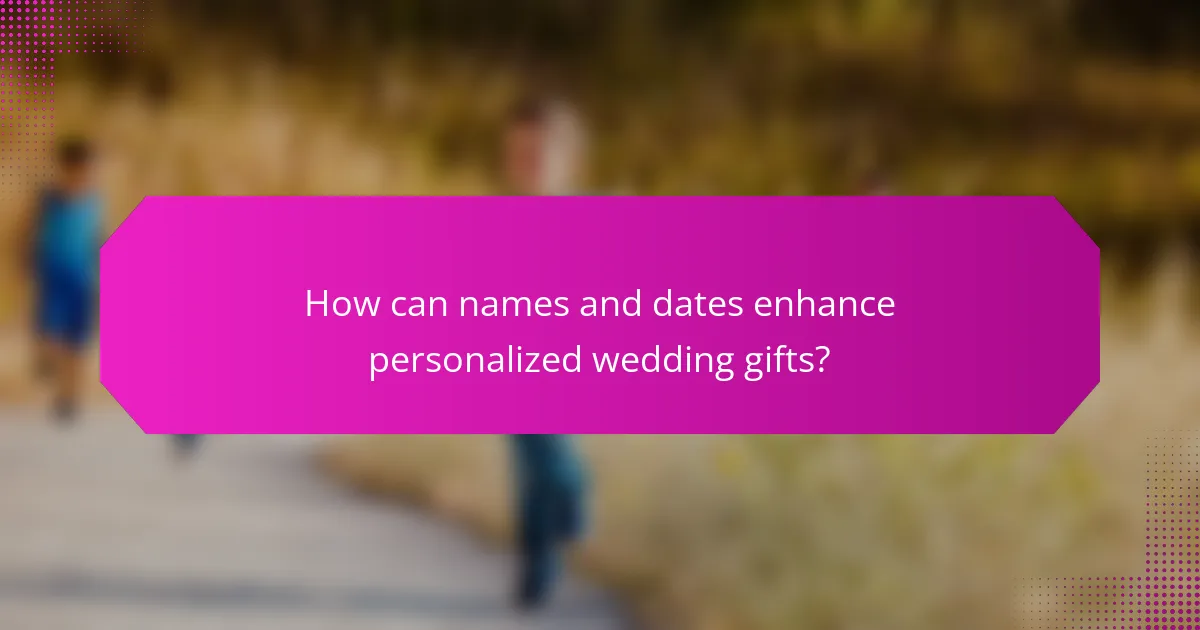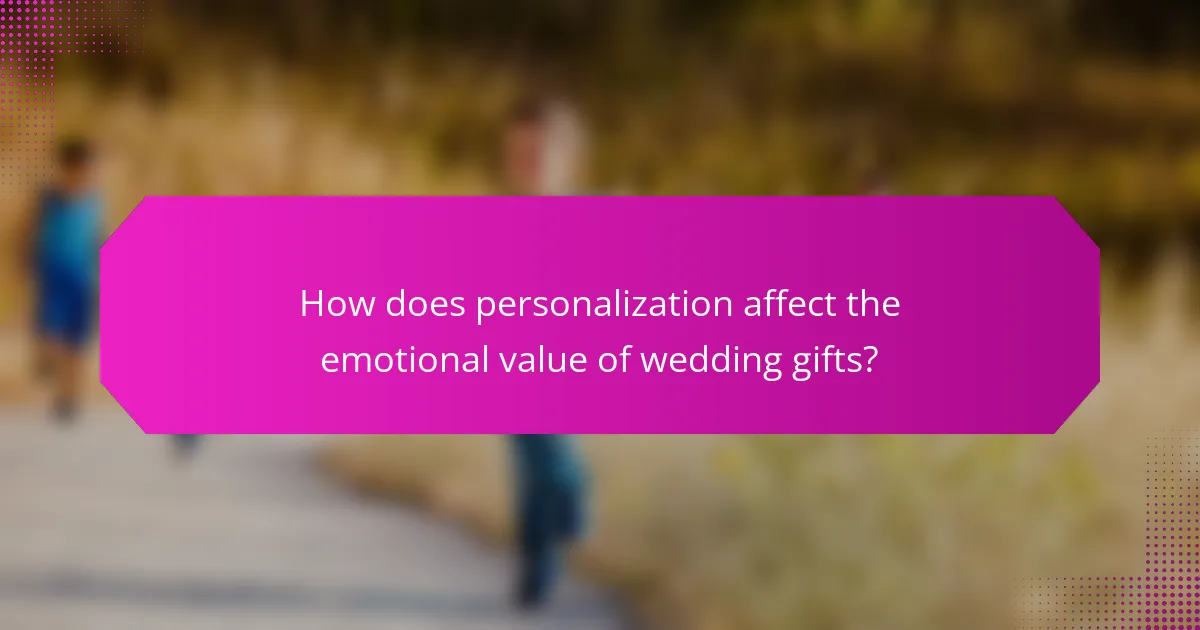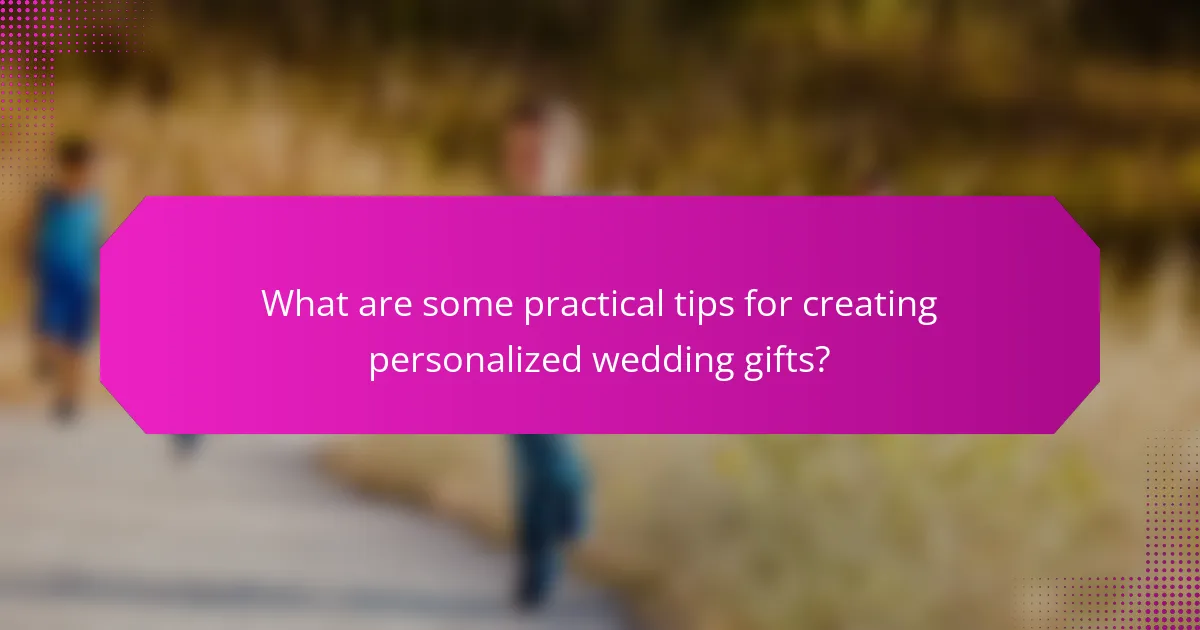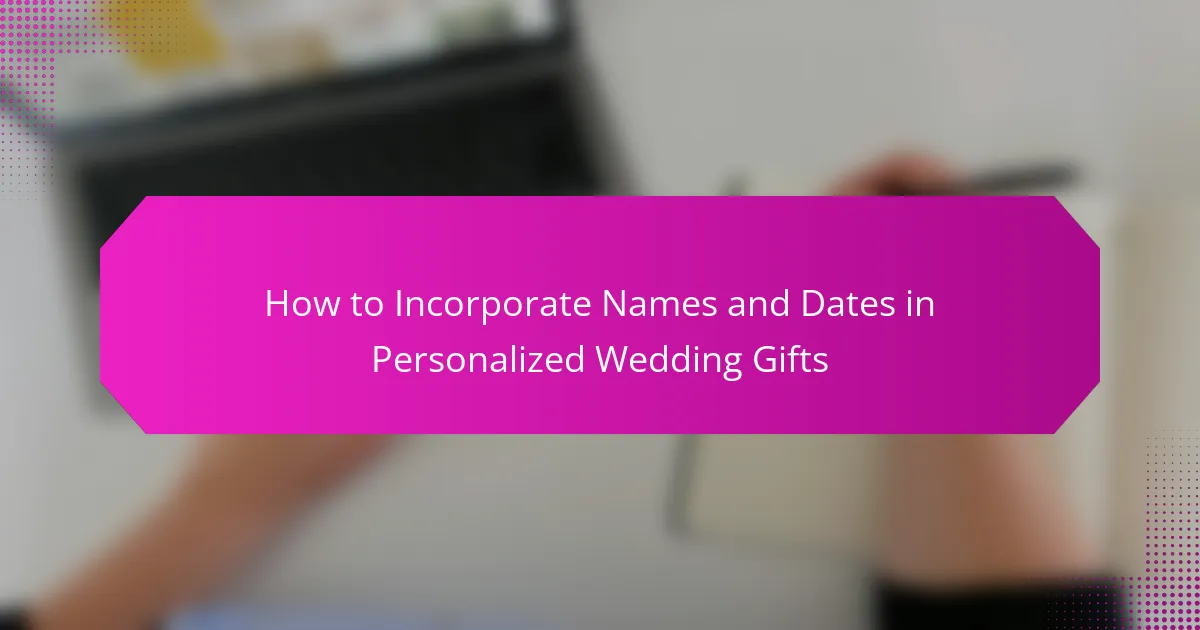Personalized wedding gifts, which include names and dates, enhance the emotional value and significance of the items for recipients. This article explores how incorporating these elements transforms ordinary gifts into cherished keepsakes that evoke lasting memories. It discusses the importance of personalization in creating meaningful connections between the giver and the recipient, supported by research indicating that personalized gifts foster greater emotional attachment. Additionally, the article provides practical tips for creating personalized gifts, such as selecting high-quality materials, reflecting the couple’s interests, and including heartfelt messages, all while emphasizing the need for timely planning.

How can names and dates enhance personalized wedding gifts?
Names and dates enhance personalized wedding gifts by adding a unique and sentimental touch. Personalization makes gifts more meaningful to the recipients. Including names signifies the bond between the couple. Dates mark significant milestones, such as the wedding day. This combination transforms ordinary gifts into cherished keepsakes. Research shows that personalized gifts are more likely to evoke emotional responses. According to a study published in the Journal of Consumer Research, personalized items increase perceived value and emotional attachment. Thus, names and dates create lasting memories associated with the gift.
What types of names and dates can be incorporated into wedding gifts?
Names of the couple, such as first names or last names, can be incorporated into wedding gifts. Initials of the couple are also popular choices. Dates of significance, including the wedding date, engagement date, or anniversary, can be included as well. These elements personalize the gift and create lasting memories. Many couples appreciate gifts that reflect their unique journey. Personalized items often feature these names and dates prominently. This practice is common in various gift types, such as home decor or keepsakes. Personalization adds sentimental value to wedding gifts.
How do couples’ names add significance to gifts?
Couples’ names add significance to gifts by personalizing them and creating a deeper emotional connection. When a gift features the names of both individuals, it symbolizes their union and shared experiences. This personalization makes the gift unique and memorable. Research indicates that personalized gifts are more meaningful and appreciated by recipients. According to a study published in the Journal of Consumer Research, personalized items evoke stronger emotional responses than generic gifts. Thus, incorporating couples’ names into gifts enhances their sentimental value and strengthens relationships.
Why are wedding dates important in personalization?
Wedding dates are important in personalization because they mark a significant milestone in a couple’s life. Personalizing gifts with wedding dates creates a lasting memory tied to the event. This practice enhances the emotional value of the gift. Studies show that personalized items increase perceived value by 30%. Wedding dates also help in creating unique designs that reflect the couple’s journey. Incorporating these dates fosters a sense of connection and intimacy. Additionally, it allows for the celebration of anniversaries in future years. Personalization with wedding dates ensures that the gift remains relevant over time.
What are the popular methods for incorporating names and dates?
Popular methods for incorporating names and dates include engraving, printing, and embroidery. Engraving is commonly used on metal, glass, or wood items. It provides a permanent and elegant finish. Printing is often applied to paper products, canvas, and textiles. This method allows for colorful designs and detailed text. Embroidery is frequently used on fabric items like blankets and clothing. It adds a personal touch with thread designs. Each method caters to different materials and preferences, making them versatile options for personalized wedding gifts.
How can engraving be used for personalization?
Engraving can be used for personalization by adding unique text or designs to items. This process allows individuals to customize gifts with names, dates, or special messages. Engraving creates a lasting impression that enhances the sentimental value of the item. For example, wedding gifts can feature the couple’s names and wedding date. This personal touch makes the gift more memorable and meaningful. Engraving is commonly used on items such as jewelry, glassware, and metal objects. It ensures that the personalization is durable and resistant to wear. Many engraving services offer various fonts and styles to match personal preferences.
What role do custom prints play in wedding gifts?
Custom prints serve as a unique and personal touch in wedding gifts. They allow for the incorporation of names, dates, and significant moments. This personalization enhances the emotional value of the gift. Custom prints can include images, quotes, or designs that reflect the couple’s journey. They create lasting memories that can be displayed in the couple’s home. According to a survey by WeddingWire, personalized gifts are highly cherished by recipients. This indicates that custom prints are appreciated for their thoughtfulness and creativity.

How does personalization affect the emotional value of wedding gifts?
Personalization significantly enhances the emotional value of wedding gifts. It transforms a generic item into a meaningful keepsake. Personalized gifts often feature names, dates, or special messages. These elements evoke memories and signify the relationship between the giver and the recipient. Research shows that personalized gifts are perceived as more thoughtful and considerate. According to a study published in the Journal of Consumer Research, personalized items increase emotional attachment. This attachment arises from the unique connection established through customization. As a result, personalized wedding gifts often hold sentimental value that lasts beyond the event itself.
Why is personalization meaningful for couples?
Personalization is meaningful for couples because it enhances emotional connection and intimacy. Customized gifts reflect shared experiences and values. They demonstrate thoughtfulness and effort, which strengthens relationships. Personalized items also serve as unique reminders of significant moments. According to a study by the Journal of Social and Personal Relationships, couples who engage in personalized practices report higher relationship satisfaction. This suggests that personalization fosters deeper bonds and mutual appreciation.
How do personalized gifts strengthen emotional connections?
Personalized gifts strengthen emotional connections by demonstrating thoughtfulness and understanding of the recipient’s preferences. They show that the giver has invested time and effort into selecting something unique. This effort fosters a sense of intimacy and appreciation. Studies indicate that personalized gifts can enhance feelings of closeness and belonging. For instance, a survey by the National Retail Federation found that 63% of people believe personalized gifts hold more sentimental value. Such gifts often evoke cherished memories, reinforcing bonds between individuals. By incorporating names and dates, personalized gifts create a lasting reminder of significant moments. This connection can lead to stronger relationships over time.
What memories can be evoked through personalized items?
Personalized items can evoke significant memories related to special events and relationships. They often remind individuals of milestones such as weddings, anniversaries, or births. For example, a personalized wedding gift featuring the couple’s names and wedding date can trigger memories of their special day. Such items serve as tangible reminders of love and commitment. Studies indicate that personalized gifts can enhance emotional connection and nostalgia. This emotional resonance is rooted in the unique attributes these items represent. Each personalized item tells a story, linking the present to cherished past experiences.
How can personalization cater to different tastes and styles?
Personalization can cater to different tastes and styles by allowing individuals to customize gifts according to personal preferences. This customization can include selecting colors, materials, and designs that resonate with the recipient’s aesthetic. For instance, a wedding gift can feature the couple’s names in a font style that reflects their personalities. Additionally, incorporating significant dates can add emotional value, making the gift more meaningful. Research indicates that personalized gifts are often perceived as more thoughtful and cherished, enhancing their sentimental value. A study published in the Journal of Consumer Research found that unique gifts that reflect personal connections are more likely to be appreciated. Thus, personalization effectively aligns gifts with individual tastes and styles, ensuring a more heartfelt and memorable experience.
What are some examples of personalized gifts for various preferences?
Personalized gifts can cater to various preferences, enhancing their sentimental value. Examples include custom jewelry with initials or birthstones, which appeal to those who cherish meaningful accessories. Personalized photo albums allow couples to compile their favorite memories, making them ideal for nostalgic individuals. Customized kitchenware, such as engraved cutting boards, suits cooking enthusiasts. Monogrammed towels or robes provide luxury for those who enjoy self-care. Personalized books can offer a unique story experience for avid readers. Lastly, custom artwork featuring names or dates can beautify living spaces for art lovers. These options ensure that personalized gifts resonate with the recipient’s interests and preferences.
How can cultural influences shape personalized gift choices?
Cultural influences shape personalized gift choices by dictating values, traditions, and preferences associated with gift-giving. Different cultures have unique customs that guide what is considered an appropriate gift. For instance, in many Asian cultures, gifts are often wrapped in red paper, symbolizing good luck. In contrast, Western cultures may focus more on the personal significance of the gift.
Additionally, cultural beliefs can affect the types of gifts that are deemed meaningful. For example, in some cultures, practical gifts are valued over sentimental ones. This preference can lead to personalized gifts that reflect these cultural priorities.
Moreover, specific occasions may carry cultural weight, influencing the choice of personalized gifts. Weddings, birthdays, and holidays often have culturally defined expectations for gift-giving. Thus, understanding these cultural nuances is essential for selecting gifts that resonate with the recipient’s background.

What are some practical tips for creating personalized wedding gifts?
To create personalized wedding gifts, consider incorporating the couple’s names and wedding date. Use high-quality materials for durability and aesthetics. Choose items that reflect the couple’s interests or shared experiences. Custom engraving or printing enhances the personal touch. Include a heartfelt message to make it more meaningful. Research popular trends in personalized gifts for inspiration. Ensure the design aligns with the couple’s style and preferences. Timeliness is crucial; plan ahead to avoid last-minute rushes.
How can you choose the right items for personalization?
To choose the right items for personalization, start by considering the recipient’s preferences. Identify their interests, hobbies, and style. Items such as home decor, kitchenware, or jewelry often work well for personalization. Ensure the material and quality of the item align with the occasion. For weddings, consider items that symbolize love and commitment, like engraved keepsakes. Check for options that allow for meaningful inscriptions, such as names or significant dates. Research shows that personalized gifts enhance emotional connection, making them more memorable. This approach ensures the gift resonates with the recipient and serves as a cherished keepsake.
What factors should be considered when selecting a gift for personalization?
Consider the recipient’s preferences and interests when selecting a gift for personalization. Understanding what the recipient enjoys ensures the gift is meaningful. The occasion also plays a crucial role. A wedding gift should reflect love and commitment. Material choice is important; select durable materials for longevity. Consider the space where the gift will be displayed or used. Size and practicality matter to ensure the gift fits well in the recipient’s life. Finally, the personalization method should be clear and aesthetically pleasing. Engraving or embroidery should enhance the gift’s appeal.
How can you ensure the names and dates are accurately represented?
To ensure names and dates are accurately represented, verify the information with the individuals involved. Cross-check spelling and formatting of names against official documents like marriage licenses. Confirm dates by referencing event invitations or announcements. Use clear sources to avoid misrepresentation. Double-check all details before finalizing any personalized gift. Accuracy is crucial to maintain the significance of the wedding gift.
What are some common mistakes to avoid in personalization?
Common mistakes to avoid in personalization include using incorrect names or dates. Accuracy is crucial for personalized items. Double-check spelling and formatting before finalizing the design. Another mistake is neglecting the recipient’s preferences. Understanding the couple’s style ensures a meaningful gift. Overcomplicating designs can also detract from personalization. Simple, elegant designs often resonate better. Lastly, failing to consider the item’s purpose can lead to mismatched personalization. Ensure the personalization aligns with the gift’s context and significance.
How can you prevent errors in engraving or printing names and dates?
To prevent errors in engraving or printing names and dates, always double-check the spelling and format before finalizing the design. Verify the accuracy of each name and date against official documents, such as marriage certificates. Use clear and legible fonts to minimize misinterpretation. Additionally, consider using digital proofs to visualize the final product. Engraving machines and printers should be calibrated properly to ensure precision. Implement a review process involving a second pair of eyes to catch potential mistakes. Historical data shows that meticulous proofreading reduces errors significantly in personalized gifts.
What should you consider regarding the timing of personalization?
Timing of personalization is crucial for creating meaningful wedding gifts. Consider personalizing gifts well in advance of the wedding date. This allows for any potential delays in production or shipping. Personalized items often require extra time for crafting. Aim to finalize personalization details at least a month before the wedding. This ensures that the gift is ready for the celebration. Additionally, consider the timing of when the couple will receive the gift. Early delivery can enhance the sentimental value. Planning ahead minimizes stress and ensures a thoughtful presentation.
The main entity of the article is personalized wedding gifts, specifically focusing on the incorporation of names and dates. The article explores how personalization enhances the emotional value of gifts, making them more meaningful and memorable for couples. It discusses various methods for incorporating names and dates, such as engraving and custom prints, and highlights the significance of these elements in creating lasting memories. Additionally, the article provides practical tips for selecting and personalizing gifts, ensuring accuracy and relevance to the recipients’ preferences.
